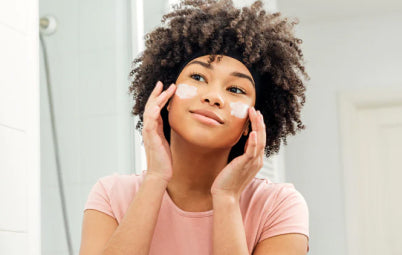When it comes to skincare, tons of ingredients can seem a bit mysterious. Perhaps you’ve seen tretinoin listed on a product or while researching acne treatments online. If you’re confused, don’t worry... this guide will break everything down for you.
At Face Dr, we encourage everyone to understand what they are applying to their skin. Our team have decades of experience in skincare, helping clients achieve results safely. We provide professional skincare from brands like Obagi Medical, ZO Skin Health, Glytone, Medik8 and Clinical Skin, and we can create a personalised routine for any skin concern.
Want to skip straight to your free consultation with a Face Dr Skin Expert? Tap below

Our team can prescribe skincare medicines, including Tretinoin. In this article, we’re shining a light on this ingredient, and everything there is to know about using it - the good, the bad and the acne!
Here’s what we’ll cover:
- What is Tretinoin?
- What is it used for?
- How does Tretinoin work?
- Who is Tretinoin best for?
- Who should avoid Tretinoin?
- Are there any Tretinoin side effects to be aware of?
- What should you avoid using with Tretinoin?
- Products and Percentages
- What products contain Tretinoin?
- Compound vs Branded and Generic Tretinoin
- Summary: Is Tretinoin for you?
What is tretinoin?

Tretinoin is the generic name for synthetic, first-generation all-trans-retinoic acid, and is the active ingredient derived from vitamin A. Its topical application was first introduced to dermatology in the 1960s, and it has been widely recognised in skincare as an effective treatment for acne.
What is it used for?
Tretinoin is primarily prescribed as an acne treatment as it helps keep pores free from impurities. Research shows tretinoin can reduce inflammation, prevent follicle clogging, and exfoliate skin. Although acne is the main use for tretinoin, it is most commonly prescribed for:
- Acne (both inflammatory and non-inflammatory)
- Dark spots and hyperpigmentation
- Fine lines and wrinkles
- Sun-damaged or uneven skin
It works not only on existing skin concerns but also helps prevent future breakouts and maintain overall skin health.
How does Tretinoin work?

You may have seen the name ‘retinol’ on skincare products in the past. Retinoids are a group of compounds derived from vitamin A, and tretinoin and retinol both fall into this category. Both encourage the stimulation of collagen and elastin, resulting in smoother skin, but here’s where they’re different:
- Retinol is the natural form of vitamin A, and is a mild version that rarely irritates sensitive skin when used properly.
- Tretinoin is the stronger, synthetic version of vitamin A and is likely to cause irritation for the first few weeks of use, so it is not always suitable for sensitive skin. This is why you’ll find retinol in high-street products, but you need a prescription for tretinoin.
Tretinoin actually works by irritating the skin as it speeds up the life cycle of skin cells, making them divide and die faster and allowing newer, healthier cells to replace them.
Who is tretinoin best for?
If you suffer from acne, this could be the ingredient you need to see results. With many skincare products, it often depends on the type of acne you experience:
- Non-inflammatory acne is more surface-level. Think blackheads and/or whiteheads.
- Inflammatory acne is sometimes referred to as cystic acne. It can be painful as it exists deep in the skin.
According to a 2017 review, topical retinoids (tretinoin being one) are highly effective on both inflammatory and non-inflammatory acne, helping to clear existing acne and reduce future breakouts. Research suggests tretinoin can also work for those with other skin concerns, as it can reduce the appearance of fine lines and wrinkles, improve sun-damaged skin, reduce dark spots, and improve skin texture and tone.
Who should avoid Tretinoin?

As effective as tretinoin can be for some, the existence of other medical problems can affect its use and effectiveness. Some people who may not benefit from using it includes:
- Dermatitis
- Seborrheic (dandruff)
- Eczema
- A fish allergy (the product may contain ingredients derived from fish)
- Sunburn (the product may irritate skin and cause itching)
In addition, if you are pregnant or breastfeeding, you may wish to opt for another product as there is a lack of data surrounding the use of tretinoin in such cases. As a prescribed treatment, it is important to communicate any possible contraindications to your Skin Expert to determine the best treatment for you.
Book your free video skincare consultation now
Are there any Tretinoin side effects to be aware of?
Just because tretinoin is applied topically does not mean it is free from possible side effects. For many people, there is a high likelihood that tretinoin will irritate skin in the first few weeks of use and could result in redness, dry skin, peeling and/or itching.
These effects should subside after a few weeks as your skin adjusts to the product, but if you are unsure of any symptoms, stop using the product and book an appointment with your Skin Expert as soon as possible to discuss altering the frequency of use or strength of the product. Some symptoms to watch out for include:
- Irritation that gets increasingly worse
- Blistering or crusting of the skin
- Swelling or excessive redness
- A change in skin pigmentation
What should you avoid using with Tretinoin?

Reactions can occur if using tretinoin in the same area as another product. Speak to your Skin Expert before using any of the following:
- Topical products containing a peeling agent like benzoyl peroxide, resorcinol, salicylic acid, or sulphur
- Products that make skin sensitive to the sun
- Irritating hair products, like hair removal products
- Products with high alcohol content, like shaving creams
- Abrasive products like some soaps, exfoliators and cleansers. Since tretinoin is likely to make skin more sensitive, your Skin Expert can advise what daily products are best used alongside
- Dry products like some makeup. Tretinoin can cause the skin to flake or peel, so makeup can be difficult to use. Keep it to a minimum and have your Skin Expert advise on which products are best
Typically, tretinoin is applied in the evening, so you may be able to apply other topical products in the day without them interfering - your Skin Expert will be able to discuss a suitable routine for you.
Products and Percentages
Tretinoin comes in a range of strengths, typically: 0.0125%, 0.025%, 0.0375%, 0.05%, 0.075%, and 0.1%. The right concentration depends on skin type, tolerance, and the severity of your condition.
Popular brands like Obagi offer Tretinoin creams (0.025%, 0.05%, 0.1%) and gels (0.05%), while generic and compounded formulations are also available.
Important: Tretinoin is prescription-only in the UK, and online purchases should be avoided unless prescribed by a licensed professional.
You can book a consultation with us to discuss a possible tretinoin product prescription, and the percentage can be adjusted over time depending on the results.
What products contain tretinoin?
There are many products containing tretinoin; however, at Face Dr, we only recommend a select few science-backed brands we feel are the best of the best. These products use medical grade ingredients, and research supports their effectiveness.
As Tretinoin is a prescription medicine, it cannot be advertised or sold online. If you do see these items online, it is likely that they are counterfeit products, and therefore unsafe. Always ensure you are buying from a reputable, licensed, or regulated pharmacy, particularly online, to avoid counterfeit or unsafe products. If you want to learn more about Tretinoin, you can book a consultation with one of our Skin Experts.
Compound vs Branded and Generic Tretinoin
Tretinoin can be prescribed as compounded formulations or ready-made branded products.
Compounded tretinoin is custom-made by specialist pharmacies to suit your skin type, allergies, and concerns. These formulations allow flexibility in cream or gel bases and often include additional moisturising or soothing ingredients. Because they are freshly made, compounded products typically have a short shelf life of around 3 months.
Branded and generic tretinoin is produced in standard formulations for wider use. Brands like Obagi Medical are widely recognised and come in multiple strengths. While generic products have the same active ingredient, the formulation, texture, and additional components may differ.
The choice between compounded, generic, or branded tretinoin depends on your skin sensitivity, treatment goals, and personal preferences, which your Face Dr Skin Expert can help determine.
Summary: Is tretinoin for you?

So, is tretinoin the skin saviour you’ve been waiting for? The answer is… possibly.
If you suffer from acne, tretinoin creams and gels may work for you, but your Face Dr Skin Expert can advise whether this product is right for your specific skin issues, under the supervision of our GP, Dr Julia Langford. We will only ever prescribe what we feel is necessary for your skin. If you receive a prescription for a tretinoin product after consultation, this product will be unlocked for you to purchase online. Here at Face Dr, we offer professional skincare from several brands, including ZO Skin Health, Obagi Medical, Glytone & Clinical Skin.
Consultations are conducted via a secure video link, so you can get expert skincare advice in the comfort of your home. There is never any obligation to purchase from us once you have your prescription, but if you do we’ll post them to you next working day, anywhere in the UK.
Ready to speak to a Skin Expert?
Want to read more about acne treatments? Click the blog posts below:
- What skincare and makeup products can I use with Tretinoin?
- Top 5 skincare tips for people suffering with acne vulgaris
- How to choose the right acne skincare routine for you
- How much does it cost to treat acne properly?











